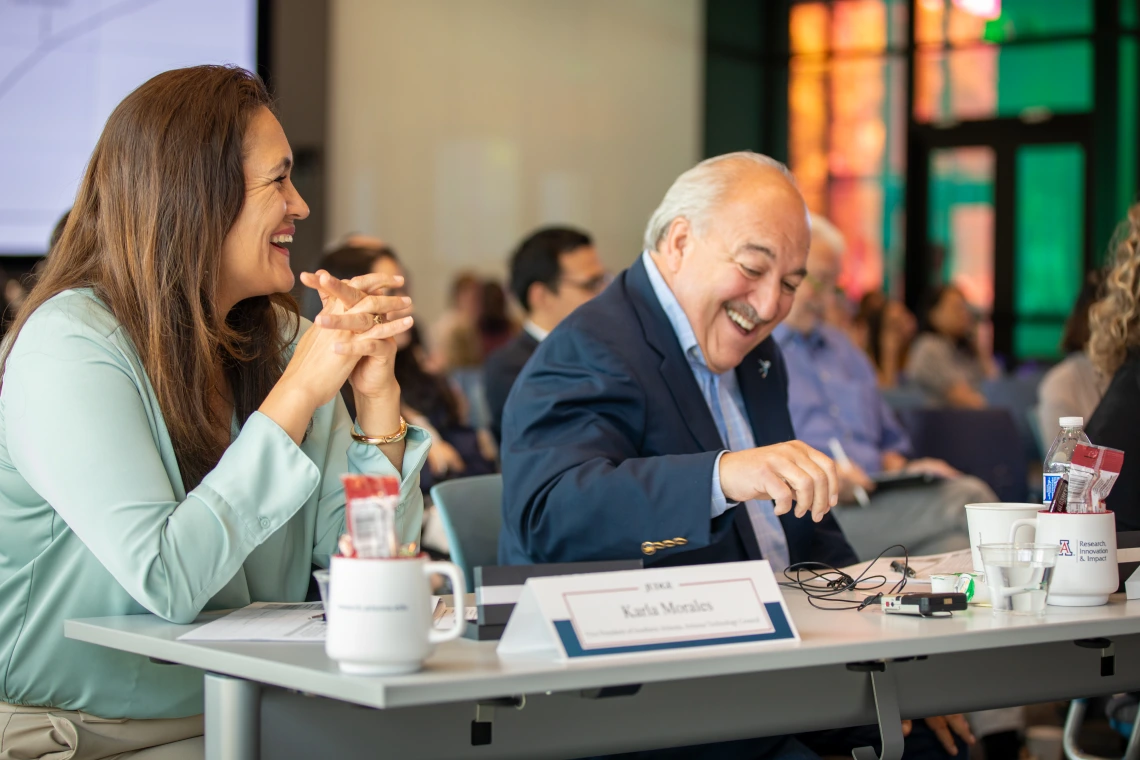
The University of Arizona’s Big Idea Challenge invests in transdisciplinary teams to accelerate discoveries that address urgent needs—from community resilience to national security—while creating new opportunities for industry, government and partners. In its first year, six teams received transformative funding to launch projects with the power to change lives and shape the future.
The University of Arizona’s Big Idea Challenge funds transdisciplinary teams tackling urgent needs—from resilience to security—while opening new doors for partners.

Pitching the Future
The first ever Big Idea Challenge Pitch Day drew a full house at the Grand Challenges Research Building, with more joining online. Finalist teams had seven minutes to pitch to a distinguished panel of judges that included senior university leadership alongside CEOs, research executives and industry leaders. By the end of the event, six teams were awarded $250,000 each to launch research with meaningful impact for Arizona and the world.
Pitch Day brought together university leadership, CEOs, and industry leaders to hear bold ideas. Six winning teams earned $250K to advance research with global impact.

Convergent Digital Health for Remote Access (CoDiRA)
CoDiRA reimagines healthcare delivery with AI-powered kiosks, remote diagnostics, medical selfies and personalized digital twins. Designed for underserved populations, this ecosystem pairs advanced tech with multilingual support, virtual education and community collaboration. Led by Dr. Srikar Adhikari, the project builds scalable, culturally sensitive models to bridge healthcare gaps in Arizona and beyond.

Summoning microbial allies to reduce nitrogen fertilizer dependency in modern agriculture
Synthetic nitrogen is essential yet inefficient and environmentally costly. This project seeks to boost nitrogen-use efficiency through microbiome-based solutions, potentially saving billions and reducing runoff damage. Led by Dr. Mark Beilstein this project is focused on sustainable agriculture in Arizona and beyond to advance innovation at the intersection of biology, food systems and environmental health.

Making Space for off-Earth Scalable Cloud Computing and Data Infrastructure
AZSCI (pronounced “A-Z Sky”) proposes migrating data infrastructure to space. Solar-powered satellites would reduce Earth-based server costs, energy use and cybersecurity risks. Ideal for defense, disaster response and AI, the project positions Arizona as a leader in orbital data innovation. Krishna Muralidharan leads this visionary initiative.

From early Earth to Mars: Landscape terraformation and digital twinning at Biosphere 2
Biosphere 2 becomes the launchpad for a new science of terraformation. Combining real-world experiments with AI-powered digital twins, this project simulates how life can shape planets. Scott Saleska leads efforts to establish a national center for terraformation and habitability—advancing planetary science, sustainability and Arizona’s global research leadership.

Heat and Health Resilience Innovation Consortium
With extreme heat causing record-breaking deaths in Arizona, this project launches a statewide consortium to develop wearable biosensors, kiosk care, multilingual apps and AI-driven health risk tools. Co-led by Dr. Amelia Gallitano and Dr. Freya Spielberg, it integrates tech, clinical training and community partnerships to save lives and lead innovation in climate-responsive health.

Invest in TIME! Earth hazards research through tree-ring science and solar archives
The TIME Lab decodes environmental and solar history by analyzing radiocarbon in tree rings with annual precision. This research reveals ancient solar storms and can be used to precision date earthquakes and associated geohazards, providing insights crucial for resilience planning. Led by Charlotte Pearson, and in partnership with planetary and solar science groups, the lab positions Arizona as a leader in earth hazards research.
In the News
"Data centers in space?" AZSCI project coverage
AZLuminaria interviews Big Idea Challenge project lead Krishna Muralidharan about the advantages of building data centers in space.
U of A names 6 teams to each get $250k through Big Idea Challenge
Tucson’s newspaper of record outlines the Big Idea Challenge, including the six award-winning projects.
U of A announces winners of inaugural Big Idea Challenge
A Primary Investigator for one of the six award-winning teams is interviewed by a local TV news station.
The U of A Big Idea Challenge (BIC) is an initiative by the Office of Research and Partnerships (ORP) to incentivize the formation of transdisciplinary research teams tackling grand global challenges. It provides seed funding to develop innovative ideas that can lead to significant external funding and societal impact.
It is open to transdisciplinary teams that include U of A faculty, students, postdoctoral researchers, and research staff. The team must include a project champion who is an experienced tenured, or tenure-track, faculty member.
Proposals that integrate multiple disciplines from these six strategic research pillars are highly encouraged:
- Defense and National Security
- Energy and Environmental Sustainability
- Health and Biomedical Sciences
- The Human Experience
- Data, Information Systems and AI
- Space Sciences
It encourages transdisciplinary research that crosses traditional academic boundaries, integrating perspectives from science, engineering, business, social sciences, arts, design, and humanities to create holistic solutions to global challenges.
Selected teams receive support from U of A Research Development Services, Lewis-Burke Associates, and Foundation Relations to identify funding opportunities. Additional support for technology transfer and public engagement is available through Tech Launch Arizona and Tech Parks Arizona.
Up to $250,000 for two years. That is $125,000 per year.
No.
Contact Information
For questions regarding this solicitation, please contact: Research Development Services
ResDev@arizona.edu
Phone: (520) 621-8585

